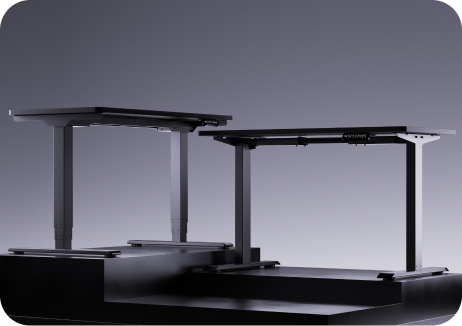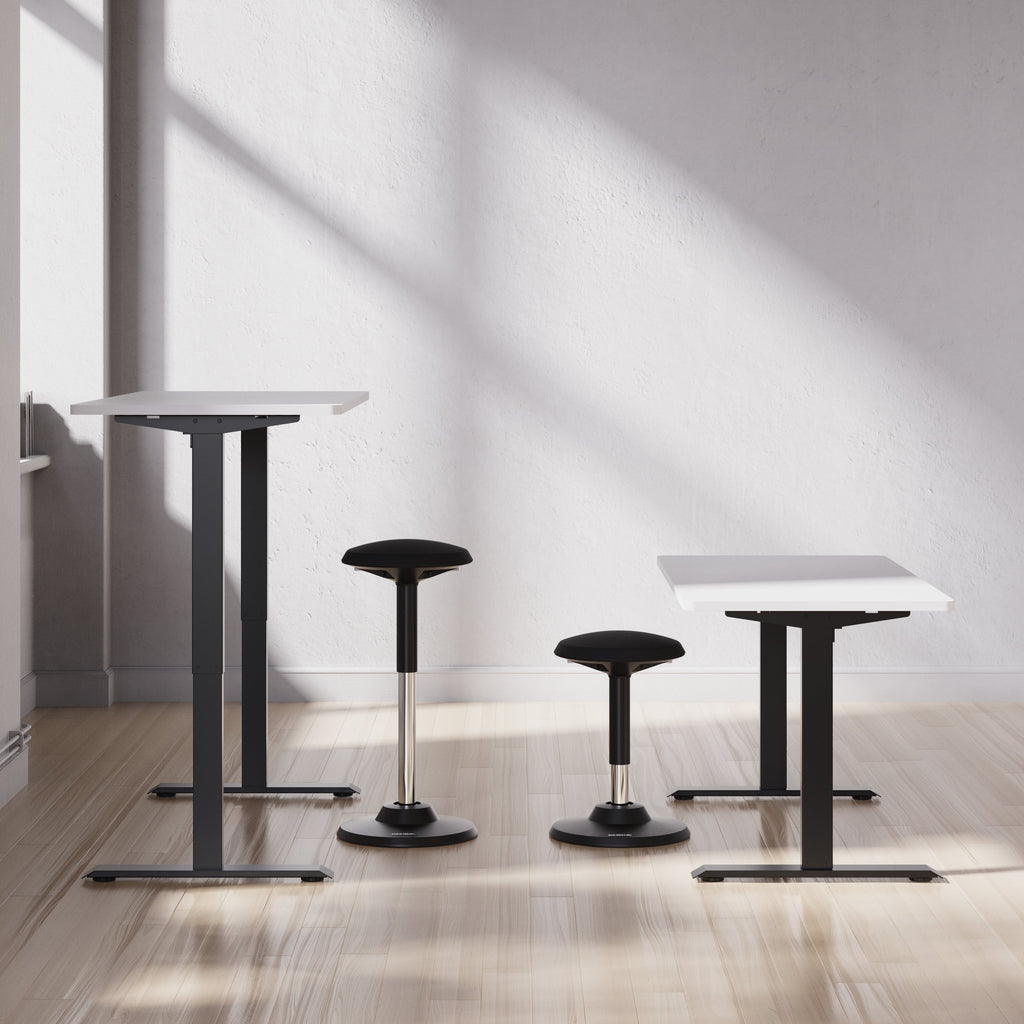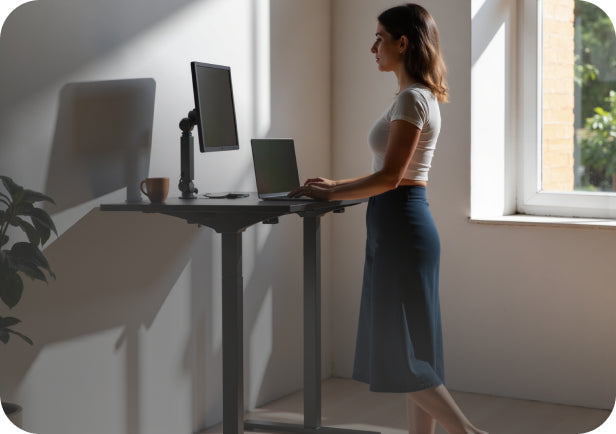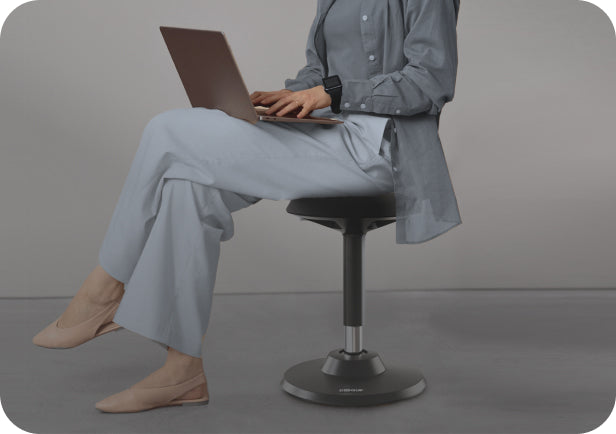Pinched nerve - this is how you can help yourself quickly and easily!

A pinched person can happen quickly at work - a wrong movement, permanent incorrect posture or an accident outside the office can lead to this. The consequences of this can vary in severity and can even include incapacity to work. Today we will show you how you can help yourself quickly if you have a pinched nerve and how you can prevent this from happening in the first place.
In addition, we explain a few important tips on the topic of "healthy posture at work" and what can happen if you don't take them seriously.
Maintaining a healthy posture at work – this is how you prevent a pinched nerve
Very few people pay attention to maintaining a healthy posture at work - whether leaning too far forward or back, too small a screen or the wrong table height , all of these things can quickly lead to health problems . A pinched nerve is just one of the many effects of incorrect posture .
In addition to this, these side effects can also occur if you always sit/work incorrectly:
- Shoulder and neck tension
- back pain
- Stiff neck
- Pain in joints of hands and arms
- wrist problems
Correct posture at work can prevent you from struggling with a pinched nerve. This primarily includes the correct, upright posture of the back and a healthy arm position. In the next paragraph, we will therefore explain to you which tips you should take to heart so that a pinched nerve does not occur in the first place.
Simple tips to prevent a pinched nerve
If you want to avoid pinching a nerve from incorrect posture , consider these basics :
- Table Height - Whether you work sitting or standing, the table height should be adjusted so that your arms are at a 90-degree angle on the table. This way you are relaxed and pain and tension do not develop so quickly
- Seat Height - If you work seated, your knees should also be at 90 degrees when you sit up straight. This way you know that the seat is adjusted correctly and that your legs are not unnecessarily strained
- Ergonomic Mouse & Keyboard – Working for hours with a mouse and keyboard often leads to tension and pain in the hand. Especially for the tendons and nerves on the top of the hand, this can lead to problems on long days, a pinched nerve is not uncommon here. The ergonomic mouse and keyboard support the natural hand position and there are no longer any problems here
- Height-adjustable desk - If you keep your circulation going and exercise regularly, you will be less likely to get pinched nerves. Therefore, try to work at a height-adjustable desk as often as possible
Tip: The optimal division for a working day consists of 60 percent sitting, 30 percent standing and 10 percent active movement. You can reach them, for example, if you make phone calls from now on when going for a walk.
If you have decided to purchase a height-adjustable desk, then you are welcome to visit the desqup website . On our detailed product pages you will find many vivid photos and detailed descriptions . We are looking forward to your visit!
But now to how you can quickly help yourself if you have a pinched nerve!
Pinched nerve, what to do? This is how you can help yourself quickly!
If you have pinched your nerve at work , it will quickly limit you very much. You may no longer be able to type properly or have constant pain in your arm or in the back and shoulder area - this is where a pinched nerve most often occurs. However, if a nerve is pinched in your shoulder, it can quickly spread to your hand.
Usual signs are: pain in a larger area, numbness or a tingling sensation, muscle weakness, restricted movement, warm spot on the skin. Nevertheless, if in doubt, you should consult a doctor again if our tips do not improve anything.
First of all, it is important to avoid the strain, because this can only worsen the problem. We advise against painkillers, because then you can no longer assign which movements you should avoid. You should also stop jerky movements, because these can also further strain the nerve and lead to severe pain.
The muscles around a pinched nerve are usually tense and only press on the painful area even more. You can loosen the muscles with a heat patch, an infrared lamp or a heating pad and try to relax the affected area.
A professional massage, which you can visit after work, also helps to ease these tensions. Here you have to take some money into your hands, but your situation usually improves much faster. However, before doing so, be sure to talk to your doctor to make sure it really is a pinched nerve.
Yoga or relaxed gymnastics can help to release tense muscles and relieve pain. You should avoid intensive training if you don't want to make the problem worse. You can also use anti-inflammatory medication to soothe the affected area.
If you do n't see any improvement , you should definitely see your doctor again. He will scan the area again and may take x-rays to get a better picture. After that, the problem may be treated further with physiotherapy or special massages – but only in particularly stubborn cases. As a rule, a pinched nerve is "free" again within a few hours .
Conclusion: first aid for a pinched nerve
From a medical point of view , a pinched nerve is actually just a small thing - but if things are going badly, it can keep you from working for many hours, days or even weeks, or at least limit you massively. Especially if you are an athlete , you can no longer practice your passion due to this small problem. With the immediate measures mentioned above, you can usually get the nerve free again within a few hours , after which you will no longer have pain. With an optimized posture and working while standing, you can prevent the nerve from getting into this situation in the first place - the furniture from desqup will help you with that.
We hope we were able to give you a few tips with this article!





























